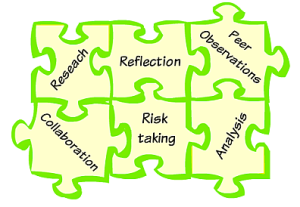At the beginning of this year I read an article by Darling-Hammond & Richardson (2009) that summarised the current research on professional development (PD) for teachers. The ideas in this article have been circling around in my thoughts and starting this blog has been one of the developments in my thinking. The research presented in the article suggests that while short term training will always have a place in schools, a long term approach to PD is required for the transformation of teaching that produces improved student outcomes. I know I personally have attended a number of one off PD days that have had little or no effect on my teaching once I’m immersed back into the rigours of a busy school. Darling-Hammond & Richardson (2009) argue that PD needs to not only be sustained over longer periods of time its content needs to be student centred, integrated into the context of the school and designed with thought into how teachers learn. This PD needs to allow teachers time to experiment with and develop new teaching approaches and paradigms. It needs to give teachers opportunities to reflect individually and collaboratively on their teaching methods and the engagement and outcomes of students.
Darling-Hammond & Richardson (2009) go on to argue for the need to develop professional learning communities that produce sustained, job imbedded, collaborative learning opportunities. The question I have been asking myself since reading this article is how do we do that? One of the answers suggested in the article is the development of study groups, where professional communities can study practice and research together, developing understanding and supporting each other as they implement new ideas. With the restrictions on available time in schools this idea throws up a number of its own challenges. How do you find time to reflect with others about your professional reading, classroom experiments, successes and failures? How do you do it in a meaningful way so that as a teacher you are involved in deep reflection of your practices?

I’m not sure if a blog will provide all the answers to these questions but it does give me the opportunity to record my professional thoughts, investigations, trials and reflections for others to read, reflect and comment on. So maybe it is one way to start developing a professional learning community that is not restricted by the limitation of timetables, classes or even the isolation of individual schools.
Darling-Hammond, L., & Richardson, N. (2009). Teacher Learning: What Matters? Educational Leadership, 66(5), 46-53.

Learning Communities « Little engine that could said
[…] Learning Communities […]
Clare Froggatt said
Reblogged this on Little engine that could.